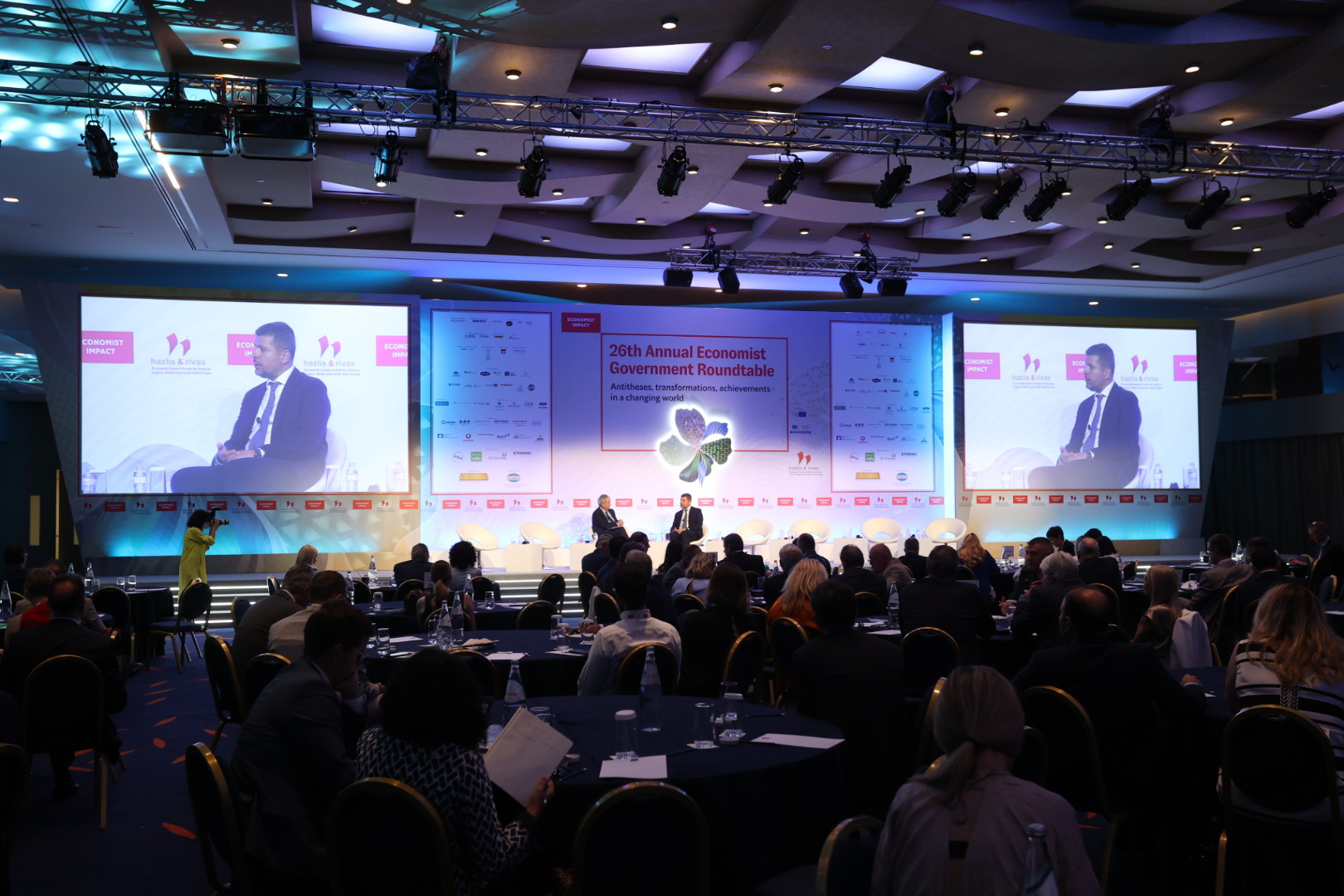During his discussion with Daniel Franklin, Executive & diplomatic editor of The Economist, the President of PPC Giorgos Stassis, answered questions about the energy transition, the global energy crisis and the initiatives taken by the company for its energy and digital transformation .
The President and CEO of PPC Giorgos Stassis participated today, Wednesday July 6, in the 26th Round Table Discussion organized by the Economist on the topic “Contradictions, transformations and achievements in a changing world”.
During his discussion with Daniel Franklin, Executive & diplomatic editor of The Economist, the President of PPC answered questions about the energy transition, the global energy crisis and the initiatives the company is taking for its energy and digital transformation.
The energy crisis accelerated the transformation of PPC
“Over the past 3 years we have embarked on a major effort to transform PPC, focusing on the energy transition, which is evolving now and will continue for decades to come. We have tried to reposition PPC on the path of this transition, taking into account what the market will be like in the coming years.
I’m talking about distribution, more RES, batteries, electrification. An entire ‘ecosystem’ whose elements must communicate with each other. All the decisions we made for this transformation were based on our 3-pillar strategy: we decarbonized PPC’s generation by removing lignite and strengthening its ‘green’ fleet – 5 GW to be added in the next 4-5 years – we are digitizing the distribution network to a large extent so that it is more flexible and able to respond to new scenarios and at the same time, we are modernizing marketing in every possible way (rebranding, new services, new products, we already have 600 charging stations for electric vehicles and we aim to installation of 10,000 chargers in the next 5 years).
These are changes that are taking place at a time when we are experiencing the most serious energy crisis since the 1970s. The plan we had before the energy crisis and the plan we are developing now are exactly the same, and our narrative has more value today than ever. The energy crisis resulted in the acceleration of the elaboration of our projects. The need to reduce dependence on traditional sources concerns both the environment and costs, but now also concerns energy security.
We are investing even more in renewables, we are investing even faster in batteries – helped by the Recovery Fund – and we will invest in everything related to flexibility. In the coming years, PPC will also develop hydrogen as we have to prepare for the future. These are changes that will be included in the revised plan that will be announced by the end of the year.
IT and digitization are keys to the energy transition
“Flexibility is a key concept. New technologies are being developed in relation to storage, so that there is greater flexibility and efficiency. Artificial intelligence, digital systems, computing systems will play a very important role and they are not far away. These are changes that are coming faster than we think and we are preparing for these changes. And industrial users will need to understand these changes and we will work with them, work ‘side by side’ to get a greener way of working and have a ‘greener’ business and a ‘greener’ operation at the level of meeting needs .
Greece can play a very important role in digitization. There are many investments coming to our country from large multinationals, as was done for example in Thessaloniki with the operation of a digital hub. Also, there is plenty of talent in Greece that can develop these technologies.
Our goal does not change: we will become independent of lignite in the next 4-5 years
“I don’t believe that the energy crisis in terms of economic impact is delaying the transition from lignite that much. We will go a little slower, about a year and a half due to energy security. We want to be ready in the event of a gas shortage. But we are not changing our medium-term goal: we will become independent from lignite in the next 4-5 years and we are committed to this.
As for the possibility that the ‘faucet’ that you are asking me should be turned off, I can tell you that Greece is in a better position than other countries, due to the alternative corridors, the alternative options available to it. We have TurkStream, we have an LNG station, we have lignite and hydrogen. When we talk about ‘turning off the tap’, we are talking about chaos in Europe and one cannot predict how the interconnected systems would react. But in the event that Greece is faced with a large deficit, I believe that industrial users should be limited, so that we can do what we can for domestic users.”
Positive developments regarding the licensing of RES in Greece
“We mainly deal with solar energy, photovoltaics which make up 2/3 of the production from RES and 1/3 wind energy. The licensing issue remains important in Europe. In Greece we have many good developments, as a result of which our projects receive licensing and develop faster than the rest of the European countries. The obstacle we now face is the global supply chain. There is a huge demand mainly for inverters for photovoltaic panels that come mainly from China”.
View the news feed and get the latest news.











